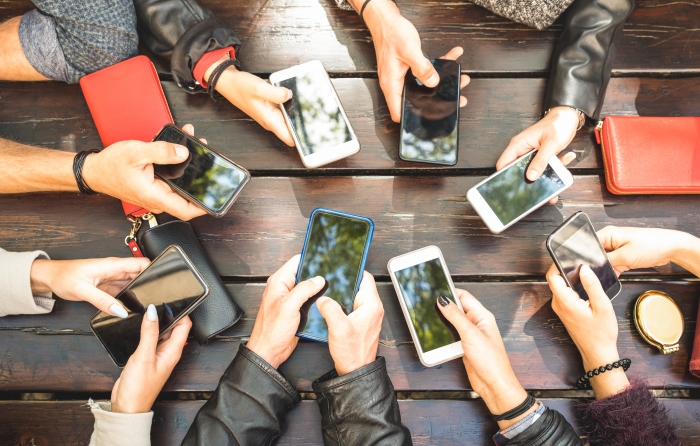“Social” media isn’t so social
Increasing phone use is hindering human interaction
Photo courtesy of New Harbinger Publications
Social media and cell phone use is making people less social. This problem is continuously increasing with new technological advances being made.
February 19, 2020
Anywhere and at any time of the day, people are on their phones. Eyes are glued to these small rectangular devices that provide many different functions, yet they tend to cut people off from the real world all around them. Humans are becoming more and more lonely as the power of technology increases.
The main issue with cell phones is that there are growing social media platforms that allow people to connect without seeing each other face-to-face. Although these apps were created for the very reason of allowing people to interact and see what others are up to, they have hindered this process in real life. The time spent on social media really depends on the person, but it has been an increasing issue among younger generations, given the popularity of apps like Instagram, Snapchat, Twitter, Facebook and TikTok.
The disconnect between the world of technology and real life causes people to be increasingly alone. A CNBC article “Loneliness is on the rise and younger workers and social media users feel it most, Cigna survey finds” cites that the Cigna US Loneliness Index found that 71% of heavy social media users surveyed reported feelings of being alone.
A part of feeling isolated is having low self-esteem. This directly roots from social media. A Huffpost article “Social Media’s Impact on Self-Esteem” carried out interviews with active social media users and found that 60% of them reported that social media impacted their self-esteem in a negative way. Posting on these platforms allows people to create an unrealistic, perfect version of themselves. Others see these posts and feel less of themselves. Low self-esteem causes some to not want to put themselves out there and create new relationships. It can also lead to anxiety, stress and depression. Loneliness and one’s feelings about themself go hand in hand and social media only worsens these.
The feeling of having no one is amplified by the struggle of hindered social skills that people have today. Interaction between people is crucial in human life. This means being able to read people’s reaction to words said and responding appropriately. According to Psychology Today a lack of connection with others can lead to social isolation, depression, substance abuse, poor sleep and appetite, suicidal thoughts and behavior and impaired immune and cardiovascular functioning. If worse comes to worst, loneliness can cause people to harm themselves or even commit suicide. Without interacting with others, humans are at risk for a lifetime of feeling alone and outcasted, which is dangerous to their mental health.
Being on phones cuts off real, face-to-face interaction between people that is needed for a healthy lifestyle. An issue with social media is that most people like to share the most interesting parts of their lives on their accounts. Knowing what everyone is doing at all times is likely to make people want to interact less, as topics are drowned out and no longer interesting.
What was meant to make people be able to connect with each other, has made them even more anti-social. A Pew Research report found that 13% of people they surveyed claimed that they pretend to be on their phone to avoid social interaction. Cell phones are giving people the ability to avoid the people around them, which is preventing true human connection.
The problem is clearly more severe among young people, as they are adapted to having their phones on them at all times. Another Pew Research survey found that 45% of teens say they are online almost constantly. With their minds still developing, teens are being molded into relying on their phones as a main source of communication. This is dangerous because it will lead to young people being unable to hold meaningful conversations and make new connections with people they meet, leaving them feeling more and more lonely.
Another risk that comes with social media is cyberbullying. Being picked on like this can cause a multitude of effects. A Very Well Family article “The Real-Life Effects of Cyberbullying on Children” claims this type of intimidation causes kids to feel overwhelmed, vulnerable, humiliated, and lonely. Social media opens up a new avenue for cyberbullies. Most of these apps allow the users to comment and direct message one another, which gives these people a way to express how they feel about what someone posts. With this new way to give opinions, people on social media are constantly at risk to receive hate, which makes them feel even more isolated.
Social media is dangerous. It allows teens to live in a fantasy world where they can appear however they want to and hide parts of themselves. The problem exists right at people’s fingertips. It’s a very hard issue to solve, however, the best way to combat this is to promote a lifestyle that includes limited social media. Whether that means parents placing controls on their kids’ accounts or schools educating the young on the dangers of a phone-heavy lifestyle, something needs to be done. The world is going to get more and more bland if people don’t take time to look up from their phones and connect in a real, true way.







